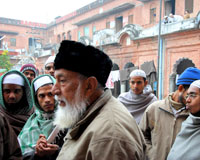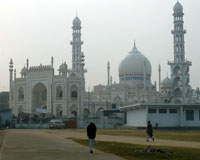Islamists forcing Deoband’s ‘liberal’ head to quit
by - 28th February 2011
 A foray into liberalism at India’s extremist Deoband seminary – spiritual home for around half of UK Muslims – has back-fired.
A foray into liberalism at India’s extremist Deoband seminary – spiritual home for around half of UK Muslims – has back-fired.
The newly elected head of the seminary is likely to quit soon, after his liberal views enraged a conservative lobby backed by Pakistan, according to reports.
The governing council of the seminary, which trains the majority of Britain’s imams, has formed a committee to look into the allegations that Vice Chancellor Maulana Ghulam Mohammad Vastanvi defied the traditions of his predecessors.
Vastanvi had offered to resign after violent clashes erupted between conservatives and his supporters over a controversial newspaper interview.
In an article in The Times of India, published on 19 January he had praised the chief minister of the state of Gujerat in which 2,000 Muslims were massacred in communal carnage in 2002.
The article quoted Vastanvi as saying that it was time for Muslims in Gujarat to move on as they were no longer discriminated against.
Worse still, he also praised Chief Minister Narendra Modi, whom India’s Muslim community and rights activists accuse of overseeing the killings.
Vastanvi’s statement is being used as a pretext to unseat him from the seminary (dar ul uloom) in Deoband town in northern India, considered second in importance to al-Azhar University in Cairo.
The Indian news portal rediff.com quoted an anonymous Deobandi lecturer as saying (February 17), ‘Evidently, the whole idea was to prevent any progressive Muslim from taking over the reins of this historic institution [Deoband].’
 The portal identified Maulana Arshad Madni, a professor of Arabic at the seminary, as the leader of the ‘ultra conservative lobby’. Madni, a north Indian whose family has dominated Deoband’s affairs for decades, was a candidate for the Mohtamim or Vice Chancellor election on January 10.
The portal identified Maulana Arshad Madni, a professor of Arabic at the seminary, as the leader of the ‘ultra conservative lobby’. Madni, a north Indian whose family has dominated Deoband’s affairs for decades, was a candidate for the Mohtamim or Vice Chancellor election on January 10.
But in a surprise move, the 18-member governing council gave the mandate to Vastanvi, a moderniser from west India who has an MBA degree, and is known for introducing western medicine, engineering, and allied courses at madrasas in western India.
Madni is considered a protégé of the Indian National Congress party, which leads the ruling United Progressive Alliance. Muslims in India have traditionally voted for the Congress.
Madni is also close to Maulana Fazlur Rahman, leader of a controversial Deobandi party in Pakistan, the Jamiat-ul-Ulema Islam (JUI), and an aide of former Pakistani Prime Minister Benazir Bhutto who was accused of creating the Taliban in the 1990s.*
A week before the governing council met on February 23, Rahman arrived in India to throw his weight behind the anti-Vastanvi lobby.
‘The proximity between Pakistani cleric Rehman and Arshad Madni was always an open secret. And even during his 17- hour long stay in Deoband, the two were seen together every minute,’ rediff.com reported on February 17.
With Rahman’s interference in Deoband, the writing on the wall for Vastanvi is for anyone to read.
Vastanvi is expected to put in his papers soon after the inquiry committee submits its report within three months.
If the committee accepts Vastanvi’s resignation, Maulana Mufti Abul Qasim Nomani - who was made a working Vice Chancellor on February 23 - will become full-fledged Mohtamim, says a statement on Deoband’s website.
Vastanvi is likely to leave Deoband back in the hands of the old guard before Ramadan starts on 1 August.
More than 600 of UK's 1350 mosques are Deobandi. Link »
16 of the 25 registered dar ul-uloom in UK are Deobandi [cited Sophie Gilliat-Ray 'Closed Worlds: (Not) Accessing Deobandi dar ul-uloom in Britain'. Fieldwork in Religion 1.1 (2005) 7-33].
The Jamiat-ul-Ulema Islam led by Maulana Fazlur Rahman is 'a hard-line Islamist party, widely considered a political front for numerous jihadi organizations, including the Taliban.'
- Nicholas Schmidle, Pakistan-based American fellow of the Institute of Current World Affairs, in 'Next-Gen Taliban', New York Times, 2008 [Schmidle was promptly expelled from Pakistan after the article was published.] Link »
'A pro-Taliban cleric in Pakistan has emerged as one of the two main contenders for the post of the country's prime minister. Maulana Fazlur Rahman, who heads the Jamiat Ulema-i-Islam [there are several spelling variations of JUI], is known for his close ties to Afghanistan's ousted Taliban regime. His is one of the most influential and resourceful organisations in Pakistan working for what is described as a "pure, Islamic state". When US and allied forces began bombing Taliban strongholds in Afghanistan last year, Fazlur Rahman led large anti-US, anti-Musharraf, and pro-Taliban rallies in Pakistan's major cities... Maulana Rahman is believed to have supplied men [for the Taliban] from his support bases in the NWFP [North West Frontier Province] and Balochistan.'
- Rahman's profile on BBC News website. Link »
*Fazlur Rahman is a fundamentalist with a difference, known for his proximity to Mrs. Benazir Bhutto of Pakistan People's Party Parliamentarians (PPPP). Despite his fundamentalist orientation, he supported her right to become the Prime Minister and opposed the campaign of the Jamaat-e-Islami (JEI) in the 1990s against a woman heading the Government of an Islamic country. Benazir rewarded him by making him the Chairman of the Parliamentary Foreign Affairs Committee and allegedly asked the Inter-Services Intelligence (ISI) to place a large amount from its secret service fund at his disposal during his travels abroad . . .The role played by Fazlur Rahman in helping Benazir and her husband in creating the Taliban led to serious differences between him and Qazi Hussain Ahmed of the JEI, who was a strong supporter of Gulbuddin [Hekmatyar, head of an anti-Soviet force in Afghanistan].
- Bahukutumbi Raman, former head of the counter-terrorism division of India's external intelligence agency Research and Analysis Wing (RAW), in 'Supping with the Maulana,' South Asia Analysis Group, 2003 Link »
'Of late, Rahman 'has toned down his pro-bin Laden and anti-US rhetoric. His party is a member of the ruling coalition in Islamabad... Thus, one cannot find fault with the decision of the Government of India to issue a visa to him.'
- Bahukutumbi Raman, South Asia Analysis Group, in 'Maulana Fazlur Rahman's Mysterious Visit to India', 2011. Link »
General Background Link »
- Log in to post comments
